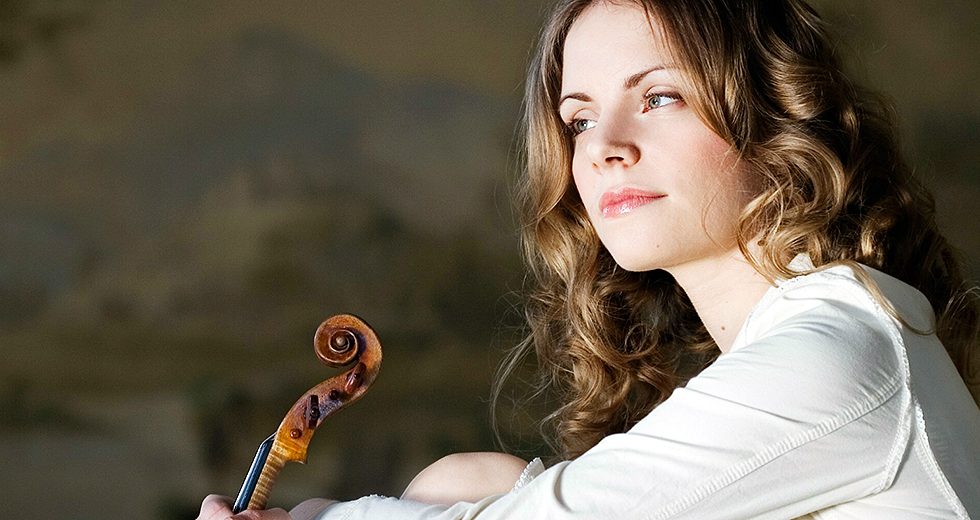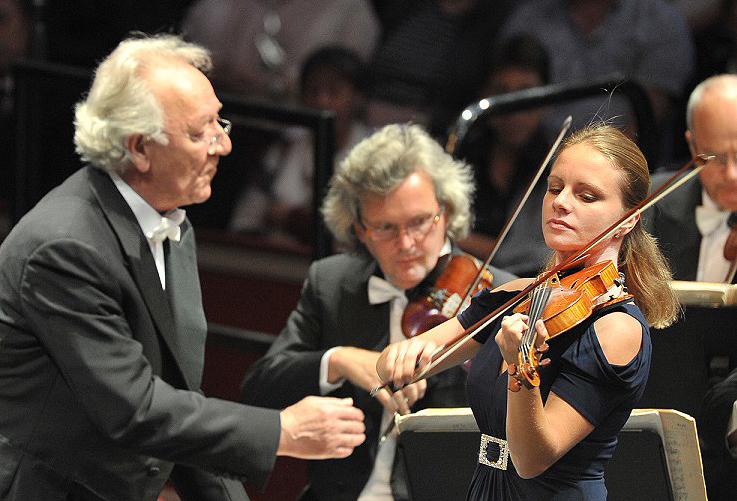
Over the last 15 years, a new group of soloists in their teens and 20s has taken the violin world by storm. What was so startling about these players was not just their super-sized talent but their gender: Nicola Benedetti, Hilary Hahn, Janine Jansen, Leila Josefowicz and Jennifer Koh. While there have been noted female violinists in the past, this wave of female stars represented a sea change. And their dominance in the field has continued right up to the present.
Another of the exciting standouts in this group is German violinist Julia Fischer, who was named Gramophone’s Artist of the Year in 2007. She shot into the international spotlight in 1995 when she won first place in the junior division of the prestigious Menuhin Competition, which was founded in 1983 by famed violinist Yehudi Menuhin. Now 32, she has gone on to a stellar career, which has included more than 15 recordings on the Decca and Pentatone labels, and appearances with many of the world’s most important orchestras and conductors.
“I guess with experience comes a different kind of freedom in every way — what repertory you choose to play, where and with whom and also in your interpretation,” Fischer said via e-mail. “And in that regard I am sure that I have changed, but some things have stayed with me over all these years. The sound maybe improves but the [musical] ideal hasn’t changed much over the past decades.”
One notable conductor with whom she has surprisingly never collaborated is Riccardo Muti, music director of the Chicago Symphony Orchestra. But that will change when she joins him and the orchestra for performances June 16-21 of Beethoven’s Violin Concerto, one of the most popular works in that form. Chicago will be her only stop on this rare visit to the United States. “I used to travel a lot to the States,” she said, “but at the moment I have two kids at home, so my priority lies in Europe.”

Julia Fischer performs with the St. Petersburg Philharmonic, conducted by Yuri Temirkanov.
A highlight of Fischer’s 2015-16 season has been complete performances of Beethoven’s 10 violin sonatas in Munich’s Prinzregententheater, Berlin’s Philharmonie, Zurich’s Tonhalle, Paris’ Théâtre des Champs-Élysées and London’s Wigmore Hall — a project that continues this summer. Joining her for this undertaking has been Russian-German pianist Igor Levit (who will make his Chicago debut next season in an SCP Piano Series recital March 12). “The repertoire that I was brought up with was quite conservative,” she said, “and therefore I spent a lot of time in my youth with Bach, Mozart, Schubert and Beethoven. I have wanted to perform the ten sonatas for a very long time, but somehow I always put it off to the next season. Finally now with Igor, we made it happen.”
The season also included a nine-city tour of Europe with the Julia Fischer Quartet, an ensemble the violinist founded in 2011. “Chamber music is the most inspiring work in my life, so of course it influences also my work as a soloist,” she said. In addition to her, the group consists of violinist Alexander Sitkovetsky, violist Nils Mönkemeyer and cellist Benjamin Nyffenegger. “We are close friends off and on stage,” Fischer said. “We trust each other and we care for each other, and that makes rehearsing much easier. We are past any diplomacy in rehearsals, and since I am not very diplomatic in rehearsals anyway, it makes it much easier for me.”
Other activities in 2015-16 included a German tour with the Academy of St. Martin in the Fields that featured the world premiere of Andrey Rubtsov’s Violin Concerto, which was written for Fischer. “We have been performing for 15 years now, and for 10 years I have also been leading them on different tours,” she said of the famed English chamber orchestra. “I am in love with this group! And I am looking forward to every project that I can have with them.”
In July, she will release an album of duos with cellist Daniel Müller-Schott, with whom she previously recorded Brahms’ Double Concerto. It will feature works by Zoltán Kodály, Maurice Ravel and Erwin Schulhoff, a Czech composer who was deported to a concentration camp in 1941 and died there a year later. Also included will be the Handel-Halvorsen Passacaglia, an 1893 work that Norwegian composer Johan Halvorsen based on a Baroque work by George Frideric Handel. In conjunction with the album’s debut, she is touring this summer in Europe with Müller-Schott.
A little more two decades after her milestone victory at the Menuhin Competition, Fischer returned in April as one of the judges for this year’s edition of the biennial contest — a validation of her extraordinary journey from an unknown student to an internationally acclaimed master. In addition, she was featured in the gala finale, joining London’s Philharmonia in a performance of Bartók’s Concerto No 1.
“In the unaccompanied opening moments,” wrote music critic Erica Jeal in the London’s Guardian, “Fischer’s sound was immediately in a different league to that of the winners we’d just heard, as if to remind us that even the winners are still unfinished artists with potentially years of development ahead. The athletics of the second, final movement could be relentless, but the first movement, Bartók’s unrequited love letter to the violinist Stefi Geyer, gloriously warm-toned, the melodic line sustained over huge spans.”
Like the rest of the Violin Femmes, as at least one headline writer once dubbed them, Fischer has reshaped the landscape of the violin world and shown that her early success was anything but a fluke.
Kyle MacMillan, former classical music critic of the Denver Post, is a Chicago-based arts journalist.